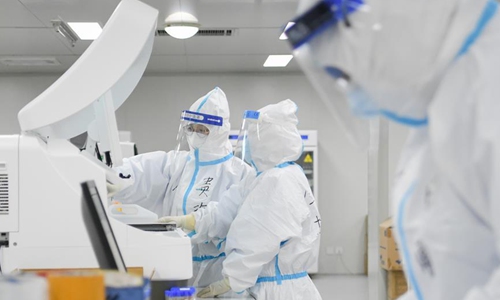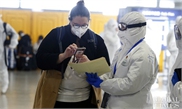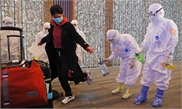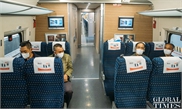
Gui Haiyan (1st L) from Guangzhou KingMed Diagnostics Group Co., Ltd. conducts detections at the clinical laboratory of the Leishenshan (Thunder God Mountain) Hospital in Wuhan, central China's Hubei Province, March 4, 2020. The laboratory brought together medical personnel from different hospitals and medical testing institution, most of whom are female. Their work is to test samples collected from COVID-19 patients and provide diagnostic information for doctors. Although they do not contact with patients directly, they still have to wear layers of protective suits for the direct contact with the virus. (Xinhua/Cheng Min)
In what is believed to be the first local patient infected by an imported case in Beijing, a man in the capital who recently tested positive for COVID-19 was likely infected by a confirmed patient who returned from the UK, as the two shared the same "polluted" stairway, Beijing's Center for Diseases Control and Prevention (Beijing CDC) said Tuesday.
The community announced that all the residents in the whole building would receive COVID-19 test on Tuesday night.
The man, surnamed Liu, 42, a Beijing local resident, felt unwell on March 10, and was diagnosed with coronavirus on Monday. Liu has been sent to a designated hospital and is in a mild condition. Liu's wife, his only close contact, later tested negative without showing any symptom, Beijing CDC said at a press briefing on Tuesday.
Liu had no history of visiting Wuhan or other places in Hubei Province, or of going abroad over the past 14 days before he felt sick.
After conducting its epidemiological investigation, Beijing CDC suspected that Liu may have become infected due to the "populated" stairway environment at his residence, as one of his neighbors surnamed Li, confirmed as an imported case, broke the rules of the 14-day home quarantine after returning to Beijing from the UK on March 5.
According to Beijing CDC, after returning, Li shopped at a nearby supermarket and walked in the residential community before showing symptoms on March 9. Li was diagnosed with coronavirus on March 12.
Disease control authorities and the community have carried out disinfection measures at Li and Liu's living environment.
Pang Xinghuo, vice head of the Beijing CDC, stressed at the press briefing that Beijing is still facing a severe situation in combating the coronavirus, and prevention and control measures such as wearing masks, avoiding crowds, washing hands and disinfection are still crucial. Pang also asked for random disinfection of public facilities in residential communities.



